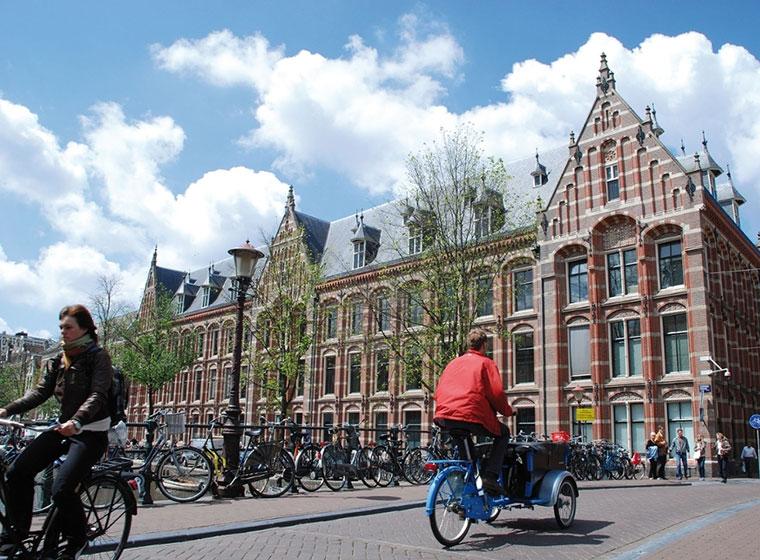Ανακοινώθηκαν από το Πανεπιστήμιο του Άμστερνταμ οι δύο ερευνητές, οι οποίοι επιλέχθηκαν προκειμένου να λάβουν την υποτροφία που προσφέρει το Ίδρυμα Αικατερίνης Λασκαρίδη, στο πλαίσιο της λειτουργίας της Έδρας Νεοελληνικών Σπουδών «Μαριλένα Λασκαρίδη». Οι υπότροφοι θα βρεθούν στο Πανεπιστήμιο του Άμστερνταμ και θα εργαστούν πάνω στα ερευνητικά τους ενδιαφέροντα στο πεδίο των Νεοελληνικών Σπουδών ως επισκέπτες ερευνητές κατά το ακαδημαϊκό έτος 2024-2025. Οι υπότροφοι ξεχώρισαν για τις ερευνητικές τους προτάσεις και επιλέχθηκαν από το Πανεπιστήμιο, σύμφωνα με τα κριτήρια που όριζε η προκήρυξη, ανάμεσα σε υποψηφίους πολύ υψηλού επιπέδου.
Το Ίδρυμα Αικατερίνης Λασκαρίδη συγχαίρει θερμά τους υποτρόφους και εύχεται καλή επιτυχία στο έργο τους!
Ακολουθεί σύντομη παρουσίαση της ερευνητικής πρότασης των υποτρόφων και βιογραφικά στοιχεία (αγγλικά).
- Christopher Jotischky: Joking with Katharevousa: Linguistic Archaism and Humour in Nineteenth-century Greek Prose
This project aims to reassess the classicizing logic of high-register Greek literary discourse during the first century of the nation’s independence by examining the relationship between katharevousa prose and humour. I shall analyse how archaizing Greek, rather than acting exclusively as a reflection of educated Greece’s desire to embody Ancient Greece as closely as possible during the period, could simultaneously present a subtle resistance to this prevailing ideology through its inherent capacity for humorous classical reception. By surveying the discourse of nineteenth-century comic novels, linguistic polemics, and literary satires, I seek to show how an archaizing prose style is integral to the humour of the works in question. The inherent multi-disciplinarity of focusing on the slippage between Modern Greek literary prose style and Classical (or classicizing) Greek is complemented by the use of nineteenth-century Greek documentary evidence to situate the project within the intellectual and social environment of Greece in that period, whose constructions of humour have yet to be studied systematically. My planned consideration of authors located within a variety of Greek-language contexts places the project within a transnational framework requiring an assessment of the relative importance of different European intellectual centres and traditions to the archaizing Greek practices of individual authors, while also allowing for a comparison of attitudes to katharevousa within the Greek state and among diaspora Greek communities, as well as across social classes. The ultimate goals are to demonstrate the multivalent implications of the use of archaizing Greek registers within nineteenth-century Greek prose and to illuminate a corner of the reception of the Ancient Greek language which is unique to the Greek-speaking world.
Bio
Christopher Jotischky completed his PhD in Classics at Brown University in 2024, following undergraduate studies at New College, University of Oxford. His research interests are in Modern Greek prose literature and Greek intellectual culture of the nineteenth and early twentieth centuries, especially concerning the development of the novel as a literary form in Greece, the construction of a literary Modern Greek language, and the use of antiquity as a paradigm of national identity formation in Greece. His doctoral thesis examined Greece’s hitherto neglected tradition of Latin literary reception, arguing that allusion to a classical model less familiar in Greece than the Ancient Greek allows authors to ask penetrating questions about the Modern Greek relationship to Ancient Greece, and to classical philology as a scientific discipline with its origins in Western Europe. He has published his research in Classical Receptions Journal, presented at numerous conferences in both Europe and North America, received multiple honours and awards, including the Modern Greek Studies Association’s S. Victor Papacosma Graduate Essay Prize in 2019.
2. Merih Erol: Armenian Refugees in Greece: Survival, Identity, and Citizenship, 1922-2022
In the aftermath of the Greek-Turkish War of 1919-1922, around 90,000 Anatolian Armenians (former Ottoman subjects) fled to Greece. As a result of this displacement, Armenians found themselves as refugees starting life from scratch in a new country with a different social and demographic makeup, political history, and different language and traditions. For an unusually long time, the refugee Armenians lived in camps supported by international humanitarian organizations, such as the Near East Relief and others, and institutions of the Greek government. Gradually, they settled in the emerging slum neighborhoods of Athens and Thessaloniki, and left their marks on these places with their churches, schools, shops, etc. Among other issues, until the late 1920s, the rehabilitation and care of the Armenian orphans whose numbers amounted to ca. 9,000 constituted an important source of concern for the Armenian community in Greece. The project explores various aspects of this forced migration; the emergency relief offered to the Armenian orphans and refugees, the Armenian refugees’ housing and settlement, their employment patterns, and citizenship issues. Based on archival materials and oral testimonies of the second- and third-generation Greek Armenians, the project combines a micro-historical approach and an analysis of broader national and international trends in dealing with the humanitarian crisis that emerged after WWI.
Bio
Merih Erol, Associate Professor of History at Özyeğin University, Istanbul, is a historian of the late Ottoman Empire, specializing in the study of nationalisms, ethnic and religious identities, and imaginings of the past through musical discourses. Her book, Greek Orthodox Music in Ottoman Istanbul: Nation and Community in the Era of Reform (Indiana University Press, 2015) demonstrated how music helped the Ottoman Greeks in Istanbul define themselves as a distinct cultural group during a period of transition, both in political and cultural terms. Her research interests include musical identities in the Age of Nationalisms, the history of the Balkans (18th-20th Centuries), religious conversion and American Evangelism in the Ottoman Empire, and post-WWI forced displacements and humanitarianism in the Middle East and the Mediterranean. Her current project is on the Armenian refugees in Greece after 1922 and aspects of Greek-Armenian identity. Her publications include “Armenians in 1920s Greece: Turkey’s Unwanted Minority, the League of Nations’ Burden, Greece’s ‘Other’ Refugees”, in Turkish Historical Review 14/2-3 (2023) (special issue on “New Critical Approaches to the Greek-Turkish Population Exchange,” guest edited by Onur Yıldırım).
